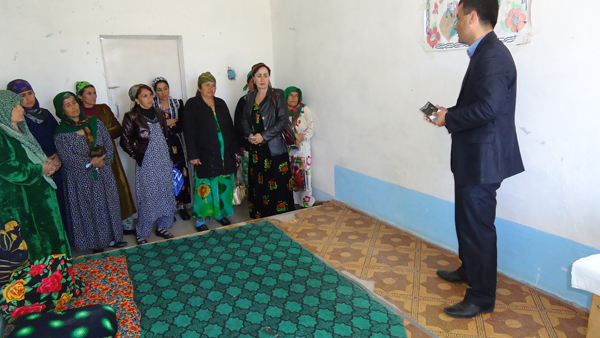
On 1 March 2013, IOM with the financial support of the Swiss Cooperation Office (SCO) launched a new project on legal empowerment of women heads of migrant households in the southern province of Tajikistan.
The project is designed to decrease the vulnerability of the wives and families of Tajik migrant workers who have left the country in search of employment by providing legal assistance and aid to those remaining home. In recent years, the number of departing Tajik migrant workers has continued to grow to the point where it now represents a significant portion of the landlocked Central Asian country’s population.
While Tajik migrant workers have contributed substantially to the reduction of poverty in the country, an unfortunate trend of abandonment of migrant workers’ families has also taken prominence. IOM has been at the forefront in identifying the concerns and needs of women heads of migrant households since 2009 when it published the first study of its kind examining the legal, economic, psychological, and social challenges bearing down on these women and their children.
Abandonment by their spouses creates significant legal challenges to Tajik women, particularly as it pertains to securing access to housing, recognition of divorce, alimony payments, land use rights, and other similar issues. Women in rural areas are hit especially hard as access to social support is considerably less and where cultural pressures to discuss the problems associated with abandonment are greater. These women then face the additional burden of limited access to employment, job training, or education.
With the SCO’s financial support and in cooperation with local civil society and governmental partners, IOM has launched this project aimed at increasing women’s access to justice while also improving their knowledge of other services available to them to increase their economic self-reliance. IOM specialists will also actively conduct a variety of actions to building women’s legal awareness, willingness, and ability to assert their rights. Such actions will include mobile consultations in rural areas, accompaniment of women to file legal documents and claims, advocating state and non-state actors to increase offerings for abandoned families of migrants, and directing women to alternative income generation opportunities.
Malika Yarbabaeva, IOM’s labour migration specialist in Tajikistan, notes that increasing the legal protection of women of migrant households is only the first step of a longer process. “Our goal is to learn together with women what opportunities exist in the community for their economic self realization and social wellbeing.” She adds, “Migration is a constant presence in many societies, and we all must work together to reduce the risks associated with it, and we hope that the public social support institutions would join us in these efforts.”
For more information, please contact:
Malika Yarbabaeva
Email: myarbabaeva@iom.int
IOM Mission in Tajikistan
